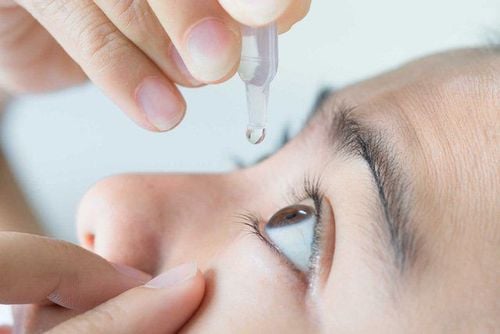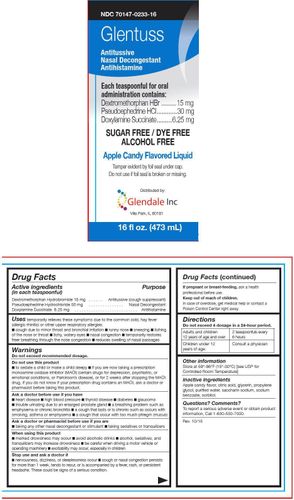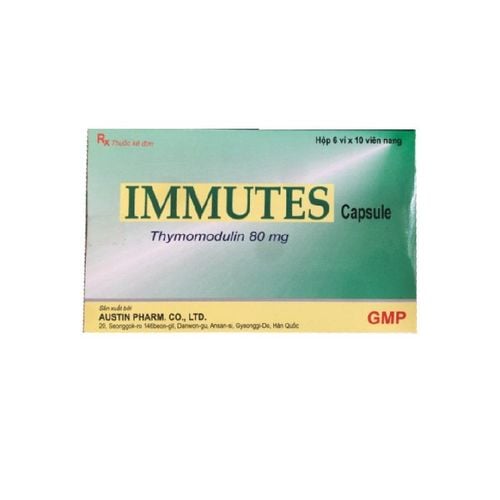This is an automatically translated article.
There are different medications to treat allergies, including oral steroids and allergy shots. In some cases, doctors may prescribe an antihistamine. However, taking allergy medicine can cause some side effects that patients should be aware of.
1. Mechanism of action of allergy medicine
When your body comes into contact with any allergens - eg pollen, dust, pet dander... it produces compounds called histamine. They cause the tissues in your nose to swell (causing congestion), runny nose, watery eyes, and an itchy mouth area. Sometimes you may also get an itchy rash on your skin.
Antihistamines reduce or block histamine, thereby preventing allergic reactions. These medications can relieve symptoms of different types of allergies, including seasonal allergies (hay fever), household allergies, and food allergies. But not all allergy medications can relieve all symptoms. To treat a stuffy nose, your doctor may prescribe a decongestant. In some cases, both antihistamines and decongestants are combined.

Thuốc dị ứng giúp làm giảm hoặc chữa khỏi tình trạng dị ứng
2. Certain Antihistamines
Antihistamines come in different varieties, including tablets, capsules, liquids, creams, nasal sprays, and eye drops. Some are available by prescription and others can be purchased over-the-counter at your local pharmacy.
Prescription antihistamines include:
Azelastine nasal spray (such as Astelin, Astepro); Carbinoxamine (Palgic); Cyproheptadine; Desloratadine (Clarnex); Azelastine eye drops (such as Optivar); Hydroxyzine (such as Atarax, Vistaril ); Emedastine eye drops (such as Emadine); Levocabastine eye drops (such as Livostin); Levocetirizine orally (Xyzal). Over-the-counter antihistamines include:
Brompheniramine ( Dimetane ); Cetirizine (Zyrtec); Chlorpheniramine (as ChlorTrimeton); Clemastine ( Tavist ); Diphenhydramine ( Benadryl ); Fexofenadine ( Allegra ); Loratadin (as Alavert, Claritin). In addition, there are eye drops that help treat allergic eye conditions, including itchy, watery eyes. In some cases, doctors combine antihistamines and decongestants to relieve congestion.

Thuốc nhỏ mắt Azelastine có là loại thuốc kháng histamin theo đơn
3. Side effects of allergy antihistamines
Older people tend to be more prone to side effects than others, especially drowsiness. Some side effects of allergy antihistamines include:
Dry mouth ; Drowsiness (Diphenhydramine, Chlorpheniramine); Dizzy; Nausea and vomiting; Restlessness or moodiness (for some children); Urinary retention or inability to urinate; Nose irritation, nosebleeds (Budesonide, Mometasone, Triamcinolone); Blurred vision (Ketotifen, Olopatadine, Pheniramine and Naphazoline); Confusion.

Một tác dụng phụ phổ biến ở thuốc dị ứng là gây dị ứng
4. Note before taking allergy medicine
For antihistamines that cause drowsiness, the patient should take this allergy medicine before going to bed. Avoid taking medication during the day before doing tasks that require concentration such as driving or using machines.
Patients should read the instructions carefully before using allergy medicine. Because antihistamines can interact with other medications you're taking. Also, talk to your doctor if you have a history of prostate enlargement, heart disease, high blood pressure, liver disease, kidney disease, thyroid problems, osteoporosis, bladder obstruction. or increased intraocular pressure. Also, tell your doctor if you are a pregnant or breastfeeding woman. In the case of allergy treatment for children, because the dose and type of medicine in children will be different than in adults.
MORE: Notes when taking allergy medicine for pregnant women
Finally, monitor and record reactions after taking allergy medicine. This will help your doctor find the most effective allergy treatment for you. In some cases, a patient may need to try several medications to choose the one that is most effective and has the fewest side effects.
Please dial HOTLINE for more information or register for an appointment HERE. Download MyVinmec app to make appointments faster and to manage your bookings easily.
References: webmd.com, mayoclinic.org













